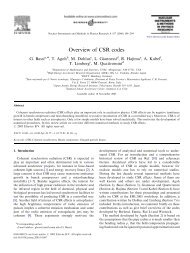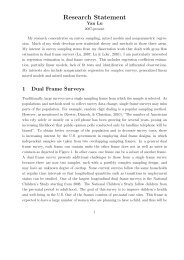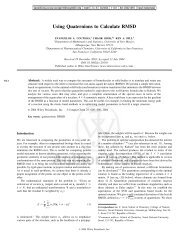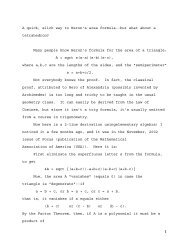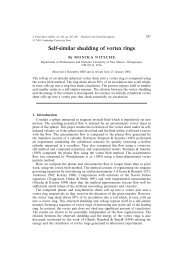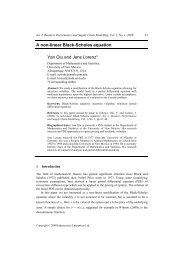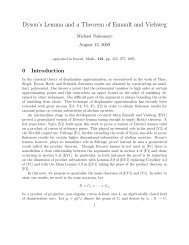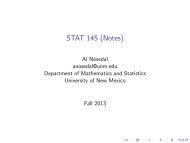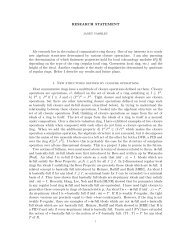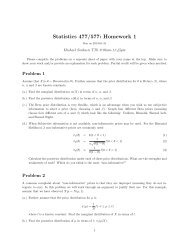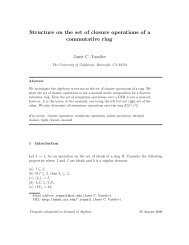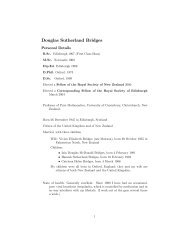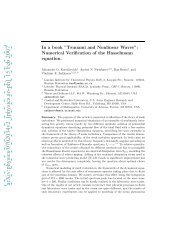OEO Office of Equal Opportunity - Department of Mathematics and ...
OEO Office of Equal Opportunity - Department of Mathematics and ...
OEO Office of Equal Opportunity - Department of Mathematics and ...
Create successful ePaper yourself
Turn your PDF publications into a flip-book with our unique Google optimized e-Paper software.
PSYCHOLOGY 277<br />
development, personality <strong>and</strong> approaches to psychotherapy.<br />
Meets New Mexico Lower Division General Education<br />
Common Core Curriculum Area IV: Social/Behavioral<br />
Sciences. {Summer, Fall, Spring}<br />
200. Statistical Principles. (3)<br />
Presentation <strong>of</strong> the basic principles <strong>of</strong> the description <strong>and</strong><br />
interpretation <strong>of</strong> data. Provides an acquaintance with statistical<br />
principles appropriate to a liberal arts education, as well<br />
as a basis for further work in data analysis. Students planning<br />
graduate study in any field are advised to take 300 <strong>and</strong> 302<br />
as well.<br />
Pre- or corequisite: 105. {Summer, Fall, Spring}<br />
220. Developmental Psychology. (3)<br />
Overview <strong>of</strong> the physical, perceptual, motor, cognitive, emotional<br />
<strong>and</strong> social development <strong>of</strong> children from infancy<br />
through adolescence.<br />
Prerequisite: 105. {Fall, Spring}<br />
231. Psychology <strong>of</strong> Human Sexuality. (3)<br />
(Also <strong>of</strong>fered as WMST 231.) Exploration <strong>of</strong> the physiological,<br />
cultural, social <strong>and</strong> individual factors that influence sexual<br />
behavior, sex roles <strong>and</strong> sex identity.<br />
Prerequisite: 105.<br />
323./523. Social Development. (3)<br />
An advanced course that presents theory <strong>and</strong> research<br />
focusing on social dynamic processes <strong>and</strong> relationshipformation<br />
within cultural settings throughout development.<br />
Prerequisites: 105, 200.<br />
324. Infant Development. (3)<br />
An advanced course that presents theory <strong>and</strong> research on<br />
the physical, cognitive, social, emotional, perceptual <strong>and</strong><br />
motor development in the first two years <strong>of</strong> life.<br />
Prerequisites: 220.<br />
328. Cognitive Development. (3)<br />
An advanced course that presents theory <strong>and</strong> research on<br />
the development <strong>of</strong> cognition, from memory <strong>and</strong> representation<br />
to spatial reasoning <strong>and</strong> concept formation.<br />
Prerequisites: 220.<br />
329. Adolescent Psychology. (3)<br />
Empirical study <strong>of</strong> adolescent development from different<br />
theoretical perspectives. Organization <strong>of</strong> individual social patterns<br />
through cultural <strong>and</strong> historical transitions <strong>and</strong> interplay<br />
between risk <strong>and</strong> protective factors in healthy development<br />
as well as deviant behaviors.<br />
Prerequisite: 200 <strong>and</strong> 220.<br />
ARTS AND<br />
SCIENCES<br />
240. Brain <strong>and</strong> Behavior. (3)<br />
A general survey <strong>of</strong> the biological foundations <strong>of</strong> behavior.<br />
Emphasis is on the central nervous system.<br />
Prerequisite: 105 <strong>and</strong> (BIOL 123/124L or 201). {Fall, Spring}<br />
250. Special Topics in Psychology. (1-3)<br />
Study <strong>of</strong> any psychological topic not otherwise included in the<br />
curriculum upon expression <strong>of</strong> mutual interest by students<br />
<strong>and</strong> faculty. May be repeated for credit because the subject<br />
matter varies.<br />
260. Psychology <strong>of</strong> Learning <strong>and</strong> Memory. (3)<br />
Survey <strong>of</strong> the variety <strong>of</strong> laboratory learning situations, with<br />
an emphasis on the application <strong>of</strong> principles to practical<br />
situations. Topics range from simple processes, such as conditioning,<br />
to complex processes, such as transfer, memory<br />
<strong>and</strong> concept formation.<br />
Prerequisite: 105. {Fall, Spring}<br />
265. Cognitive Psychology. (3)<br />
Study <strong>of</strong> the cognitive processes involved in the encoding,<br />
storage, retrieval <strong>and</strong> use <strong>of</strong> knowledge including attention,<br />
memory, comprehension, categorization, reasoning, problem<br />
solving <strong>and</strong> language.<br />
Prerequisite: 105. {Fall, Spring}<br />
271. Social Psychology. (3)<br />
Study <strong>of</strong> social influence: perception <strong>of</strong> oneself <strong>and</strong> others,<br />
attitudes, conformity, attraction, altruism, aggression, <strong>and</strong><br />
groups.<br />
Prerequisite: 105. {Fall, Spring}<br />
300. Intermediate Statistics. (3)<br />
Complex analysis <strong>of</strong> variance designs (factorial, mixedmodel,<br />
Latin square, unequal-n) <strong>and</strong> nonparametric tests.<br />
Prerequisite: 200. Corequisite: 301L.<br />
301L. Quantitative Psychology Lab. (1 to a maximum<br />
<strong>of</strong> 2) ∆<br />
Computational techniques for statistical methods covered in<br />
300. Emphasis placed on the use <strong>of</strong> a computerized statistical<br />
package, e.g., SPSS®.<br />
Corequisite: 300.<br />
302. Psychological Research Techniques. (3)<br />
Application <strong>of</strong> the concepts covered in 200. Includes discussion<br />
<strong>of</strong> basic principles <strong>of</strong> research design <strong>and</strong> scientific<br />
methodology as applied to psychology.<br />
Prerequisite: 200.<br />
322L. Developmental Psychology Lab. (2)<br />
Research projects related to topics in 324, 328, 329.<br />
Prerequisite: 220. Pre- or corequisite: 324, 328 or 329.<br />
331. Psychology <strong>of</strong> Personality. (3)<br />
Survey <strong>of</strong> theory, research <strong>and</strong> applications <strong>of</strong> both classical<br />
<strong>and</strong> contemporary approaches to the study <strong>of</strong> personality.<br />
Prerequisite: 200 <strong>and</strong> 220.<br />
332. Abnormal Behavior. (3)<br />
Review <strong>of</strong> the historical, scientific <strong>and</strong> ethical issues in the<br />
field <strong>of</strong> psychopathology. Categorization <strong>of</strong> deviant behavior,<br />
theories <strong>of</strong> abnormal behavior, systems <strong>of</strong> therapy <strong>and</strong> relevant<br />
research are covered.<br />
Prerequisite: 105.<br />
335L. Clinical Psychology Lab. (2)<br />
This laboratory course is designed to <strong>of</strong>fer students exposure<br />
to the wide variety <strong>of</strong> research that is typically conducted in<br />
the field <strong>of</strong> clinical psychology. It will teach students how to<br />
read <strong>and</strong> critique the relevant literature in an area <strong>and</strong> how to<br />
design solid studies to answer specific research questions.<br />
Prerequisites: 200 <strong>and</strong> 332.<br />
341L. Behavioral Neuroscience Lab. (2)<br />
A laboratory course designed to introduce students to basic<br />
techniques in neuroanatomy, functional imaging <strong>and</strong> neurosurgery.<br />
Prerequisite: 240.<br />
342. Evolution, Brain <strong>and</strong> Behavior. (3)<br />
A survey <strong>of</strong> contemporary research <strong>and</strong> theory derived from<br />
an evolutionary perspective on behavior.<br />
Prerequisite: 240.<br />
343. Developmental Neuroscience. (3)<br />
Conceptual, empirical <strong>and</strong> methodological issues involved in<br />
studying the processes <strong>of</strong> pre- <strong>and</strong> post-natal brain growth.<br />
Experimental, neurobiological <strong>and</strong> genetic factors in normal<br />
<strong>and</strong> abnormal development will be considered.<br />
Prerequisite: 240.<br />
344. Human Neuropsychology. (3)<br />
The analysis <strong>of</strong> brain-behavior relationships regarding affect<br />
<strong>and</strong> higher cognitive functions (language, memory, spatial<br />
reasoning) in humans.<br />
Prerequisites: 240.<br />
347. Drugs <strong>and</strong> Behavior. (3)<br />
Study <strong>of</strong> the pharmacological action <strong>and</strong> physiological <strong>and</strong><br />
psychological effects <strong>of</strong> drugs <strong>of</strong> abuse including stimulants,<br />
depressants, narcotics <strong>and</strong> hallucinogens.<br />
Prerequisite: 240.<br />
UNM CATALOG 2006–2007 Symbols, page 611.



